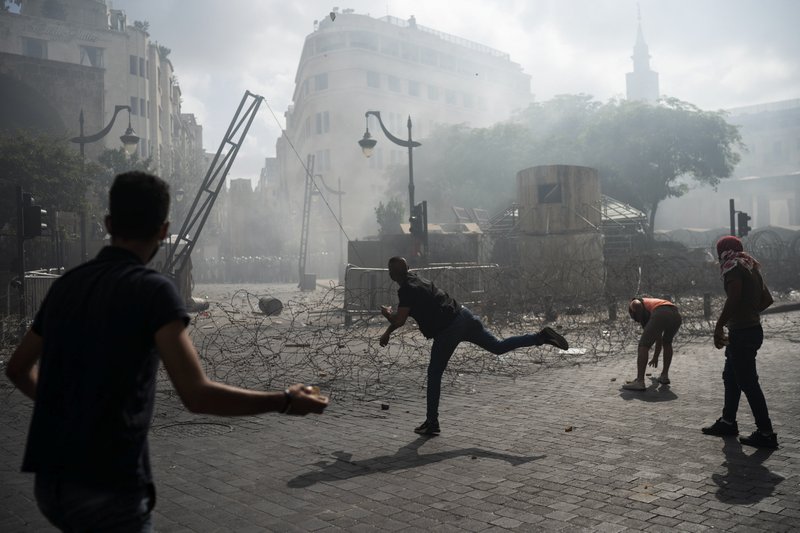Public fury over this week’s massive explosion in Beirut took a new turn Saturday night as protesters stormed government institutions and clashed for hours with security forces, who responded with heavy volleys of tear gas and rubber bullets.
One police officer was killed and dozens of people hurt in the confrontations, which played out in streets that were wrecked from Tuesday’s blast at the port that devastated much of the city and killed nearly 160 people. Dozens were still missing and nearly 6,000 people injured.
The disaster has taken popular anger to a new level in a country already reeling from an unprecedented economic and financial crisis and near bankruptcy.
Activists who called for the protest set up symbolic nooses at Beirut’s Martyrs’ Square to hang politicians whose corruption and negligence they blame for the explosion.
The blast was fueled by thousands of tons of ammonium nitrate that had been improperly stored at the port for more than six years. Apparently set off by a fire, the explosion was by far the biggest in Lebanon’s troubled history and caused an estimated $10 billion to 15 billion in damage, according to Beirut’s governor. It also damaged 6,200 buildings and left hundreds of thousands of people homeless.
“Resignation or hang,” read a banner held by protesters, who also planned to hold a symbolic funeral for the dead. Some nooses were also set up along the bridges outside the port.
Khodr Ghadir, 23, said the noose was for everyone who has been in power for the last 30 years. “What happened was a spark for people to return to the streets.”
A placard listed the names of the dead, printed over a photo of the blast’s enormous pink mushroom cloud. “We are here for you,” it read.
Dozens of protesters stormed the buildings of government ministries and the headquarters of the banking association, turning their rage to state and financial institutions.
Earlier Saturday, the protesters entered the empty buildings of the foreign ministry, declaring it a headquarters of their movement. Others then fanned out to enter the economy and energy ministries, some walking away with documents claiming they will reveal the extent of corruption that permeates the government. Some also entered the environment ministry.
Many protesters said they now had only their homes and even those are no longer safe. They blamed the government’s inefficiency and political division for the country ills, including the recent disaster that hit almost every home.
The violence unfolded on the eve of an international conference co-hosted by French President Emmanuel Macron and United Nations Secretary-General Antonio Guterres aimed at bringing donors together to supply emergency aid and equipment to the Lebanese population.
In a televised speech Saturday evening, Prime Minister Hassan Diab said the only solution was to hold early elections, which he planned to propose in a draft bill. He called on all political parties to put aside their disagreements and said he was prepared to stay in the post for two months to allow time for politicians to work on structural reforms.
The offer is unlikely to soothe the escalating fury on the street.
In central Beirut, some protesters threw stones at security forces, who then released heavy tear gas. Near parliament, protesters tried to jump over barriers that closed the road leading to the legislature. The protesters later set on fire a truck that was fortifying barriers on a road leading to parliament.
At least 238 people were hurt in the clashes, and 63 of them needed to be taken to the hospital, according to the Red Cross. Several protesters were carried away with blood running down their faces. At one point, gunfire could be heard, but its source was not immediately clear.
The country’s ruling class, made up mostly of former civil war-era leaders, is blamed for incompetence and mismanagement that contributed to Tuesday’s explosion.
“The current leaders’ bloodline needs to end. We want the death of the old Lebanon and the birth of a new one,” said Tarek, a 23-year-old university student who had prepared a mix of water and paint in a bottle to throw at the police. No peaceful protest would bring about change, he said.
Sandy Chlela, a 35-year old from Kousba in the north, disagreed with Tarek. She said she had no illusion that the protests would bring change, but the demonstrations were a necessary expression of anger and puts some pressure on the politicians.
“I know it will not change much but we can’t act as if nothing happened,” the computer programmer said.
The state, which is investigating the cause of the explosion, has been conspicuously absent from the ravaged streets of Beirut, with almost zero involvement in the cleanup. Instead, teams of young volunteers with brooms have fanned out to sweep up broken glass and reopen roads.
The U.S embassy in Beirut tweeted that “the Lebanese people have suffered too much and deserve to have leaders who listen to them and change course to respond to popular demands for transparency and accountability.”
Documents that surfaced after the blast showed that officials had been repeatedly warned for years that the presence of 2,750 tons of ammonium nitrate at the port posed a grave danger, but no one acted to remove it. Officials have been blaming one another, and 19 people have been detained, including the port’s chief, the head of Lebanon’s customs department and his predecessor.
The protests came as senior officials from the Middle East and Europe visited in a show of solidarity with the tiny country that is still in shock.
The president of the European Council, Charles Michel, arrived in Beirut for a brief visit. Turkey’s vice president and the country’s foreign minister met Aoun and said that Ankara was ready to help rebuild Beirut’s port and evacuate some of the wounded to Turkey for treatment.
At the site of the blast, workers continued searching for dozens of missing people.
(AP)











